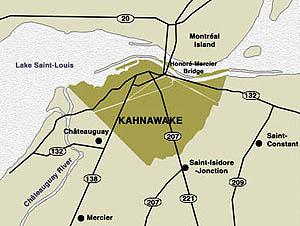Mohawk tribe evicts non-natives
Map of Kahnawake Mohawk reservation. (Image from kahnawakelonghouse.com)
This story is adapted from a broadcast audio segment; use audio player to listen to story in its entirety.
A Mohawk community near Montreal, Canada, is divided over the basic question of who is allowed to live in their community. Last month, Mohawk leaders of the Kahnawake Reservation issued eviction notices to 25 non-native residents.
The move is based on a tribal law that is meant to protect the community’s Mohawk culture and identity. It says only people who are at least 50 percent Mohawk can live in the 20-square-mile reservation.
But some of the people who received the order to move out are fighting back. They say the eviction is unfair and amounts to racism.
That’s not the way Joe Delaronde sees it. He’s a spokesman for the Mohawk Council of Kahnawake.
“We’re on 13,000 acres here and that’s all we have left, our little corner of the world,” said Delaronde. “So we kind of protect it like a pit bull. So it seems more dramatic than it is, but if you live around here and you see the amount of non-native people who interact with us and work here and visit here all the time, you’ll see it’s not that dramatic at all. The only thing that we’re saying here is that, if you’re a non-native person, you’re expected to not live here. “
Delaronde adds that natives of the Kahnawake community who marry out are also expectected to move away, and that moving away could be just moving to the next town, a five-minute drive from reservation.
“No one is saying you can’t marry someone from another culture or another race,” he says. “It’s just that the law says you’re expected to move away. It doesn’t mean you can’t come back to visit every single day of your life and maintain all of your connections. The only thing is, at the end of the day, you also have to go home.”
To the charge of racism by those who face eviction, Delaronde points to French-speaking Quebec, which created legislation to protect its language and culture.
“We’re just trying to maintain who we are in the little corner of the universe here,” he argues. “So that we can maintain our way of life and our identity, because it would not be fair to our ancestors and certainly not fair to our descendants to come, if we just allowed ourselves to fall away into the mist and disappear.”
Those who may not be full-blooded Mohawk but want to embrace their parents’ culture are allowed back into the community if they marry back in.
As for what it means to be a Mohawk, Delaronde says its hard to explain unless you are part of the Mohawk community. And that’s what the community wants to protect. “Well, we’re loyal to the Iroquois Confederacy. We’re only one of six nations of the Iroquois Confederacy. And that goes back hundreds and hundreds of years. And that’s our country. That’s who we are. We have our ceremonies and we have our language. We have our way of life that — a lot of it is common to what everybody else does — but there are things that just make us who we are.
“We don’t hate Canada. We don’t hate the United States. We just love who we are and protect it at all costs.”
PRI’s “The World” is a one-hour, weekday radio news magazine offering a mix of news, features, interviews, and music from around the globe. “The World” is a co-production of the BBC World Service, PRI and WGBH Boston. More “The World.”
